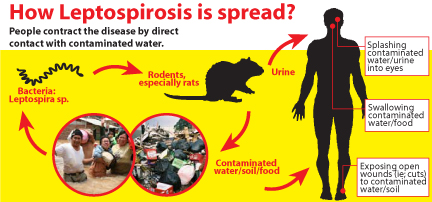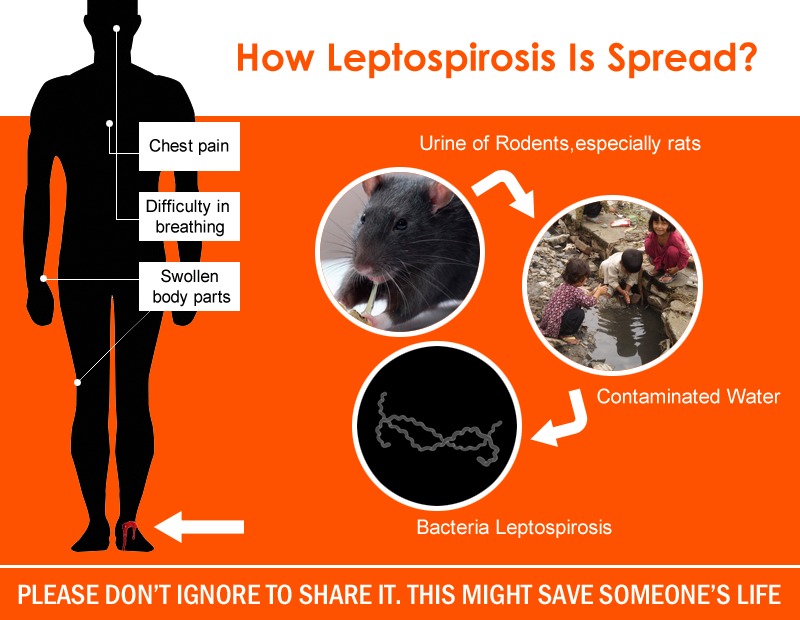It is a bacterial infection that spread from animals to humans but rarely from man to man. It is a rare medical condition that occurs in 10 in 100,000 people annually. Leptospirosis is caused by a bacterium called- Leptospira interrogans.

The infection spread through the urine of infected animals- dogs, horses, rodents, pigs etc. When the urine or faeces of infected animal come in contact with opened skin (probably from bruise, scratches, cut etc) of a man, the individual will be infected. Generally speaking, people become infected through:
- Drinking of contaminated water
- Contact with contaminated water through the eyes, nose or mouth
- Unhealed and open wounds that come in contact with contaminated water or soil
- Contact with the blood of an infected animal, though rare.
- Very rarely human to human during sexual intercourse or breastfeeding.
The bacteria lives in the animals’ kidneys and expelled during urination to the soil or water body. The bacteria can remain in the soil or water for months. Chances of infection increases after flooding.

SIGNS AND SYMPTOMS
In most cases, leptospirosis is not life-threatening and rarely lasts more than a week. However, about 10% of the cases can have severe form of the disease that will require hospitalization. Symptoms can arise about 2 days to four weeks after exposure to the bacteria.
The following symptoms are seen in the first phase of the disease: high grade fever, chills/ rigor, headache, muscle pain, joint pain, fatigue, sore throat, vomiting, diarrhea, jaundice and reddish eyes. The symptoms listed are constitutional that is they are not only seen or related to leptospirosis. For this reason, high level of suspicion is required to make the right diagnosis.
Some patients do not progress to the second phase of the disease while others briefly recover but relapse with more severe symptoms and organ damage. This second phase is also called Weil’s disease. Symptoms may overlap with the first-phase symptoms in severe disease and include the following:
- kidney failure
- Liver failure
- Heart problems
- Lung problem (pulmonary hemorrhage and pneumonitis)
- Septic shock
- Brain problems
HOW TO PREVENT LEPTOSPIROSIS
- Avoid wadding, swimming or contact with rivers, streams and lake water, especially after flooding or shower thoroughly after exposure.
- Before swimming, cover skin cut with waterproof dressing.
- Those who work with animals or potentially contaminated water or soil should wear personal protective equipment like gloves, mask, boots and googles.
- If fresh water is your available source of drinking water, do not drink unless boiled or treated with chemicals.
- Wash your hands with soap and water after handling animals and animal products.
- Always wear footwears to avoid contact with animal urine or faeces in the soil.
- CDC advocate use of doxycycline once in a week if you are travelling to an environment where is there is outbreak of leptospirosis. It confers 95% protection. This drug is not recommended for long term exposure only for short term.
- Dogs and other domesticated animals should be vaccinated against leptospirosis.
IS LEPTOSPIROSIS TREATABLE?
Yes, it is treatable!
Overall, the prognosis of leptospirosis is good. Many people become infected and spontaneously recover without treatment. However, the prognosis worsens as the symptoms increase. People with Weil’s disease or second phase of leptospirosis may have a prognosis ranging from good to poor, depending on their response to treatment. Pregnant women who become infected have a high rate of fetal mortality, especially if they acquire the disease early in pregnancy.
FURTHER READING
https://www.cdc.gov/leptospirosis/index.html
https://www.medicalnewstoday.com/articles/246829
https://www.webmd.com/a-to-z-guides/what-is-leptospirosis
https://www.medicinenet.com/leptospirosis/article.htm
https://www.who.int/water_sanitation_health/diseases-risks/diseases/leptospirosis/en/
https://www.who.int/zoonoses/diseases/leptospirosis/en/

